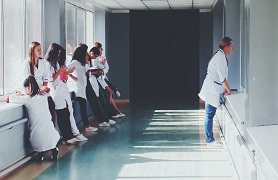Industries
How Ohio H.B. 197 Affects Health Care Providers
 On March 25, 2020, the Ohio General Assembly passed H.B. 197, which enacts a number of provisions to assist health care providers during the COVID-19 (a.k.a. coronavirus) pandemic. As enacted, H.B. 197 contains the following emergency measures related to health care providers:
On March 25, 2020, the Ohio General Assembly passed H.B. 197, which enacts a number of provisions to assist health care providers during the COVID-19 (a.k.a. coronavirus) pandemic. As enacted, H.B. 197 contains the following emergency measures related to health care providers:
- Licensure Extensions During the State of Emergency H.B. 197 defers requirements for licensure renewal for providers until either 90 days after the state of emergency ends or until December 1, 2020, whichever comes first. Disciplinary actions against license holders, including suspension and potential revocation of licenses, generally will be allowed to continue during the state of emergency.
- Certified Registered Nurse Anesthetists (CRNAs) H.B. 197 permanently grants CRNAs, under certain conditions, the authority to perform additional duties and services related to anesthesia care, including administering IV fluids, ordering diagnostic tests, and directing nurses to administer drugs.
- Temporary Nursing Licenses HB. 197 allows for recent nursing graduates to obtain a temporary license to practice prior to passing the licensure examination, provided the nursing graduate has completed all other licensure requirements. The temporary licenses will be valid until December 1, 2020, or 90 days after the state of emergency expires, whichever comes first.
- Medicaid Community Providers and Workforce Support H.B. 197 authorizes the Ohio Medicaid director, during the state of emergency or until December 1, 2020, whichever comes first, to classify certain providers as COVID-19 community providers. By classifying certain providers as COVID-19 community providers, the Medicaid director is able to direct Medicaid funds to these providers. H.B. 197 also authorizes the Medicaid director to request that the Office of Budget and Management designate additional funds related to the COVID-19 outbreak for Medicaid payments to these COVID-19 community providers, make payments to COVID-19 community providers, and facilitate payments to COVID-19 community providers by transferring funds to the Departments of Developmental Disabilities and Mental Health and Addiction Services via intrastate transfer vouchers.
- Rehiring of Certain State Workers Permitted. H.B. 197 allows the rehiring of recently retired workers at the state’s prisons agency, youth prisons, Department of Mental Health and Addiction Services, Department of Veterans Services and Department of Developmental Disabilities.
- Child Care Centers Providers who have child daycare centers may continue to provide services during the state of emergency even if they are short-staffed, as H.B. 197 has suspended the rules regarding the maximum number of children per child care staff member and maximum group sizes. H.B. 197 also authorizes the Ohio Department of Job and Family Services to continue to pay providers of publicly-funded child care centers during the state of emergency.
Should you have any questions regarding H.B. 197’s health care provider provisions, please contact Ms. Rubin.
___________________
Disclaimers:
At the date of publication the above information was correct. It is quite possible the information above has changed as COVID-19 is a rapidly evolving situation.
The article in this publication has been prepared by Eastman & Smith Ltd. for informational purposes only and should not be considered legal advice. This information is not intended to create, and receipt of it does not constitute, an attorney/client relationship.
